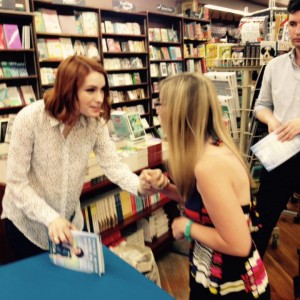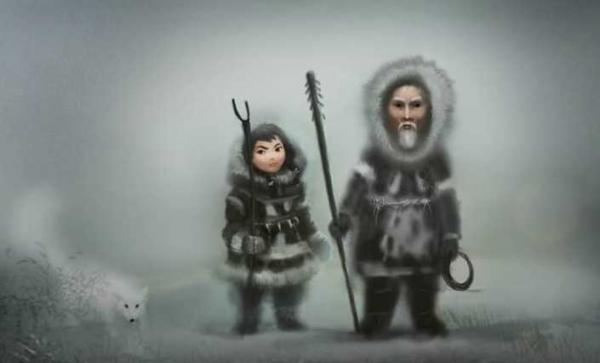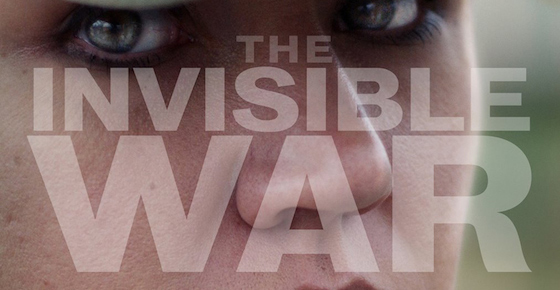 A few weeks ago, on a brutally hot day, I met someone I’ve admired for some time. I attended Felicia Day’s book signing at the Brookline Booksmith, an independent bookstore the Boston community holds near and dear. My stomach gurgled in a nasty way as I approached the table where she stood, a welcoming smile on her face and a hot coffee in hand. After she signed my copy of her book, I nervously thanked her for making it okay to be a woman in the gaming community, a space that’s not always welcoming of female-identifying people. I also mentioned, in my bumbling way, that I never knew writers had a place in the gaming industry and that now, as a result of her contributions, I write for several pop culture websites. Prior to watching Day’s The Guild, a hilarious web series about online gamers, a community I’m familiar with, I always thought the gaming world was reserved for engineers (aka non-creative types). She grabbed hold of my hand, looked me in the eye, and urged me to keep writing. The intense moment caught me off guard, but in a good way.
A few weeks ago, on a brutally hot day, I met someone I’ve admired for some time. I attended Felicia Day’s book signing at the Brookline Booksmith, an independent bookstore the Boston community holds near and dear. My stomach gurgled in a nasty way as I approached the table where she stood, a welcoming smile on her face and a hot coffee in hand. After she signed my copy of her book, I nervously thanked her for making it okay to be a woman in the gaming community, a space that’s not always welcoming of female-identifying people. I also mentioned, in my bumbling way, that I never knew writers had a place in the gaming industry and that now, as a result of her contributions, I write for several pop culture websites. Prior to watching Day’s The Guild, a hilarious web series about online gamers, a community I’m familiar with, I always thought the gaming world was reserved for engineers (aka non-creative types). She grabbed hold of my hand, looked me in the eye, and urged me to keep writing. The intense moment caught me off guard, but in a good way.
I ravenously consumed You’re Never Weird on the Internet (Almost), Day’s memoir, three days after the signing. I love Day’s sense of humor because she pokes fun at herself and her own neurotic tendencies, which is something I can relate to. Her comedic tone deeply saturates every single sentence and, at times, the stories she narrates are borderline absurd and I mean that in the best way possible. One of the major themes in her honest memoir is the importance of community, which lies at the root of geek culture. Geek culture simply wouldn’t be if it weren’t for the community the fuels it.
It’s difficult to define geek culture because it largely encompasses a variety of things such as movies, videogames, anime, etc. The net widens with each new television show or comic book. Day has been dubbed the Queen of Geek, a title she has mixed feelings about. When I met Day, it was like meeting the pinnacle of geek culture. I’m not sure what that means or how to properly describe it, but Day’s celebrity status highlights the fact that geeks are cool and can be successful. The line outside the bookstore wrapped around two buildings and there was genuine companionship among her fans and admirers. Day’s fans withstood the sweltering heat with smiles on their faces because she’s an integral part of geek culture, a positive representation of a geek. We needed someone like her to come along.
 For a period of time, I struggled with the word geek and what it means to be one. I never believed my interests were important or that they would one day elevate my career in writing. I never even imagined the possibility of an entire community sharing my interest. The Internet opened up a myriad of worlds for me, introducing me to a number of amazing people across the globe, some of which I’m still friendly with today. What began as a negative term, a stereotypical term that othered individuals interested in tech, ended up turning into a chic and positive word or label. Geeks are more mainstream now, which is a great thing. However, some uglier parts of the community emerged such as GamerGate, where discussion appears to be less about a shared interest and more about the bullying and targeting of specific individuals.
For a period of time, I struggled with the word geek and what it means to be one. I never believed my interests were important or that they would one day elevate my career in writing. I never even imagined the possibility of an entire community sharing my interest. The Internet opened up a myriad of worlds for me, introducing me to a number of amazing people across the globe, some of which I’m still friendly with today. What began as a negative term, a stereotypical term that othered individuals interested in tech, ended up turning into a chic and positive word or label. Geeks are more mainstream now, which is a great thing. However, some uglier parts of the community emerged such as GamerGate, where discussion appears to be less about a shared interest and more about the bullying and targeting of specific individuals.
In one of Day’s last chapters, she describes her experience with GamerGate and goes into detail about the doxxing. The GamerGate community, a primarily online community, juxtaposes with the more welcoming community she describes at the beginning of her book. When she first tapped into the Internet, the community she involved herself with resembled the one that I described while waiting in line for her book signing. There was a familial connection there, a kind of unspoken understanding. Though Gamer Gate represents a portion of gamers and the people that make up geek culture, it doesn’t represent all of us. If it weren’t for the exceptional people I’ve come to know, the people that make the community worthwhile, I wouldn’t have been brave enough to voice my opinions and be myself.
I’m only acquainted with Day’s persona, the offbeat nerd who laughs at herself and isn’t afraid to be who she is. Though we only interacted for a few seconds or so, I was astounded and touched by her effort to make our brief meeting meaningful. She was a genuinely kind person, someone that really cares, and not so different from the community she’s best known in. Her excitement for all things geeky is contagious. She’s a nerd just like the rest of us.



 Unless you’ve […]
Unless you’ve […]
